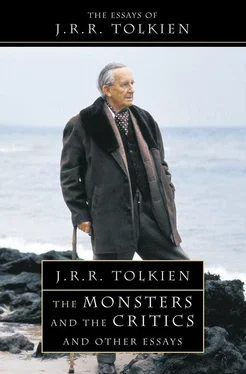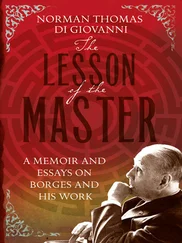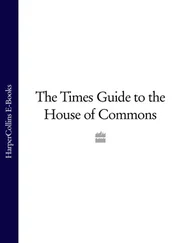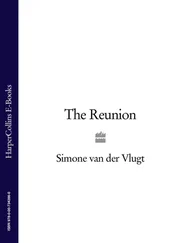Of course, I do not assert that the poet, if questioned, would have replied in the Anglo-Saxon equivalents of these terms. Had the matter been so explicit to him, his poem would certainly have been the worse. None the less we may still, against his great scene, hung with tapestries woven of ancient tales of ruin, see the hœleð walk. When we have read his poem, as a poem, rather than as a collection of episodes, we perceive that he who wrote hœleð under heofenum may have meant in dictionary terms ‘heroes under heaven’, or ‘mighty men upon earth’, but he and his hearers were thinking of the eormengrund, the great earth, ringed with garsecg , the shoreless sea, beneath the sky’s inaccessible roof; whereon, as in a little circle of light about their halls, men with courage as their stay went forward to that battle with the hostile world and the offspring of the dark which ends for all, even the kings and champions, in defeat. That even this ‘geography’, once held as a material fact, could now be classed as a mere folk-tale affects its value very little. It transcends astronomy. Not that astronomy has done anything to make the island seem more secure or the outer seas less formidable.
Beowulf is not, then, the hero of an heroic lay, precisely. He has no enmeshed loyalties, nor hapless love. He is a man, and that for him and many is sufficient tragedy. It is not an irritating accident that the tone of the poem is so high and its theme so low. It is the theme in its deadly seriousness that begets the dignity of tone: lif is lœne: eal scœceð leoht and lif somod. So deadly and ineluctable is the underlying thought, that those who in the circle of light, within the besieged hall, are absorbed in work or talk and do not look to the battlements, either do not regard it or recoil. Death comes to the feast, and they say He gibbers: He has no sense of proportion.
I would suggest, then, that the monsters are not an inexplicable blunder of taste; they are essential, fundamentally allied to the underlying ideas of the poem, which give it its lofty tone and high seriousness. The key to the fusion-point of imagination that produced this poem lies, therefore, in those very references to Cain which have often been used as a stick to beat an ass – taken as an evident sign (were any needed) of the muddled heads of early Anglo-Saxons. They could not, it was said, keep Scandinavian bogies and the Scriptures separate in their puzzled brains. The New Testament was beyond their comprehension. I am not, as I have confessed, a man so diligent as duly to read all the books about Beowulf , but as far as I am aware the most suggestive approach to this point appears in the essay Beowulf and the Heroic Age to which I have already referred. 13I will quote a small part of it.
In the epoch of Beowulf a Heroic Age more wild and primitive than that of Greece is brought into touch with Christendom, with the Sermon on the Mount, with Catholic theology and ideas of Heaven and Hell. We see the difference, if we compare the wilder things – the folk-tale element – in Beowulf with the wilder things of Homer. Take for example the tale of Odysseus and the Cyclops – the No-man trick. Odysseus is struggling with a monstrous and wicked foe, but he is not exactly thought of as struggling with the powers of darkness. Polyphemus, by devouring his guests, acts in a way which is hateful to Zeus and the other gods: yet the Cyclops is himself god-begotten and under divine protection, and the fact that Odysseus has maimed him is a wrong which Poseidon is slow to forgive. But the gigantic foes whom Beowulf has to meet are identified with the foes of God. Grendel and the dragon are constantly referred to in language which is meant to recall the powers of darkness with which Christian men felt themselves to be encompassed. They 14are the ‘inmates of Hell’, ‘adversaries of God’, ‘offspring of Cain’, ‘enemies of mankind’. Consequently, the matter of the main story of Beowulf , monstrous as it is, is not so far removed from common mediaeval experience as it seems to us to be from our own… . Grendel hardly differs 15from the fiends of the pit who were always in ambush to waylay a righteous man. And so Beowulf, for all that he moves in the world of the primitive Heroic Age of the Germans, nevertheless is almost a Christian knight. 16
There are some hints here which are, I think, worth pursuing further. Most important is it to consider how and why the monsters become ‘adversaries of God’, and so begin to symbolize (and ultimately to become identified with) the powers of evil, even while they remain, as they do still remain in Beowulf , mortal denizens of the material world, in it and of it. I accept without argument throughout the attribution of Beowulf to the ‘age of Bede’ – one of the firmer conclusions of a department of research most clearly serviceable to criticism: inquiry into the probable date of the effective composition of the poem as we have it. So regarded Beowulf is, of course, an historical document of the first order for the study of the mood and thought of the period and one perhaps too little used for the purpose by professed historians. 17But it is the mood of the author, the essential cast of his imaginative apprehension of the world, that is my concern, not history for its own sake; I am interested in that time of fusion only as it may help us to understand the poem. And in the poem I think we may observe not confusion, a half-hearted or a muddled business, but a fusion that has occurred at a given point of contact between old and new, a product of thought and deep emotion.
One of the most potent elements in that fusion is the Northern courage: the theory of courage, which is the great contribution of early Northern literature. This is not a military judgement. I am not asserting that, if the Trojans could have employed a Northern king and his companions, they would have driven Agamemnon and Achilles into the sea, more decisively than the Greek hexameter routs the alliterative line – though it is not improbable. I refer rather to the central position the creed of unyielding will holds in the North. With due reserve we may turn to the tradition of pagan imagination as it survived in Icelandic. Of English pre-Christian mythology we know practically nothing. But the fundamentally similar heroic temper of ancient England and Scandinavia cannot have been founded on (or perhaps rather, cannot have generated) mythologies divergent on this essential point. ‘The Northern Gods’, Ker said, ‘have an exultant extravagance in their warfare which makes them more like Titans than Olympians; only they are on the right side, though it is not the side that wins. The winning side is Chaos and Unreason ’ – mythologically, the monsters – ‘but the gods, who are defeated, think that defeat no refutation ’. 18And in their war men are their chosen allies, able when heroic to share in this ‘absolute resistance, perfect because without hope’. At least in this vision of the final defeat of the humane (and of the divine made in its image), and in the essential hostility of the gods and heroes on the one hand and the monsters on the other, we may suppose that pagan English and Norse imagination agreed.
But in England this imagination was brought into touch with Christendom, and with the Scriptures. The process of ‘conversion’ was a long one, but some of its effects were doubtless immediate: an alchemy of change (producing ultimately the mediaeval) was at once at work. One does not have to wait until all the native traditions of the older world have been replaced or forgotten; for the minds which still retain them are changed, and the memories viewed in a different perspective: at once they become more ancient and remote, and in a sense darker. It is through such a blending that there was available to a poet who set out to write a poem – and in the case of Beowulf we may probably use this very word – on a scale and plan unlike a minstrel’s lay, both new faith and new learning (or education), and also a body of native tradition (itself requiring to be learned) for the changed mind to contemplate together. 19The native ‘learning’ cannot be denied in the case of Beowulf. Its display has grievously perturbed the critics, for the author draws upon tradition at will for his own purposes, as a poet of later times might draw upon history or the classics and expect his allusions to be understood (within a certain class of hearers). He was in fact, like Virgil, learned enough in the vernacular department to have an historical perspective, even an antiquarian curiosity. He cast his time into the long-ago, because already the long-ago had a special poetical attraction. He knew much about old days, and though his knowledge – of such things as sea-burial and the funeral pyre, for instance – was rich and poetical rather than accurate with the accuracy of modern archaeology (such as that is), one thing he knew clearly: those days were heathen – heathen, noble, and hopeless.
Читать дальше












